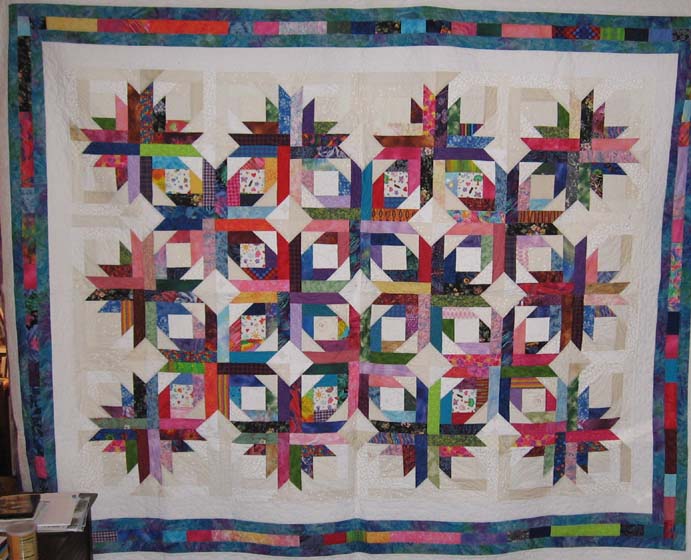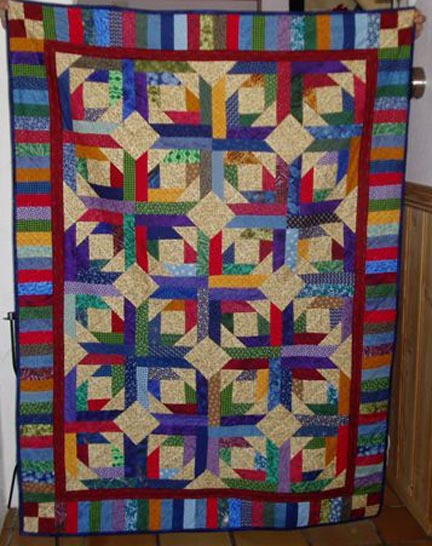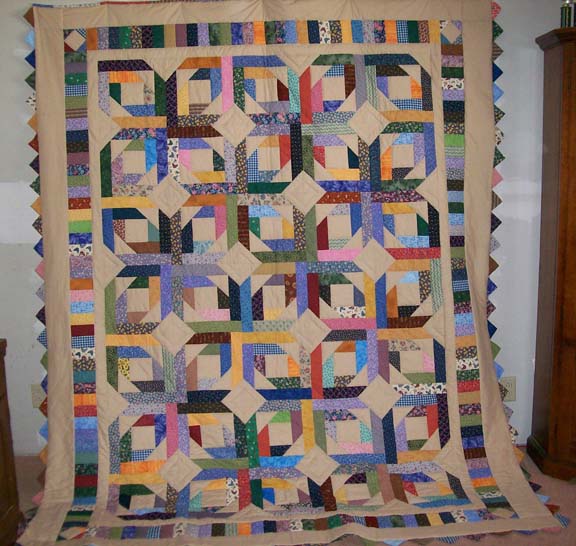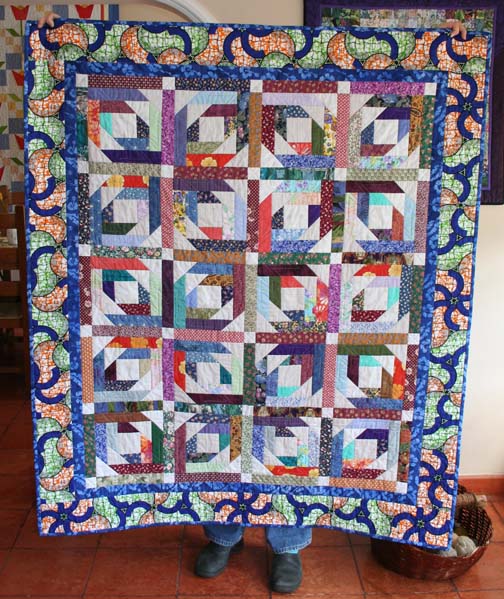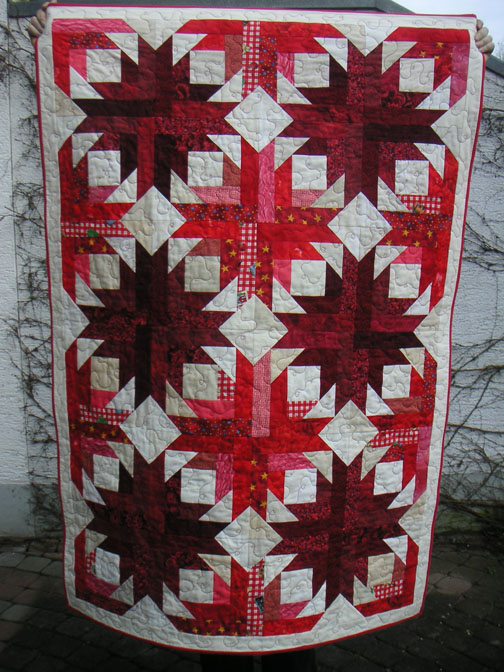-Рубрики
- Аудиокнига (225)
- Mixed med (117)
- вышивка (3502)
- вышивка крестиком (3150)
- Многоцветки (124)
- ришелье (29)
- Вязание (9908)
- вязание для взрослых (5465)
- журналы (136)
- вязание для детей (1028)
- носки, варежки (643)
- советы, узоры (922)
- сумки вязаные (237)
- тапки, коврики, подушки ... (1253)
- шапки (885)
- энциклопедия (139)
- Декупаж (1666)
- Игрушки (1916)
- Развивалки (30)
- Интерьер, декор (299)
- Шебби-шик (63)
- Кино (140)
- коробочки, шкатулки (33)
- Косметика, мыло, парфюм (136)
- Красивые фото (97)
- кулинария (5661)
- выпечка (1831)
- Кексы, печеньки (270)
- десерт (557)
- заготовки (348)
- из овощей (159)
- Мультиварка (256)
- на обед (565)
- напитки (192)
- салаты, закуски (681)
- сборники, советы (223)
- торты (1057)
- Лепка (413)
- Новый год (2595)
- новый год (7)
- Пасха (124)
- полезности (1341)
- здоровье (353)
- компьютер (163)
- разное (454)
- Рисование (318)
- рукоделие разное (2388)
- валяние (17)
- игольницы (101)
- конфетно-букутное (43)
- коробочки, шкатулки (429)
- плетение из газет (97)
- Сад-огород (469)
- Свадебное (99)
- Скрапбукинг (787)
- Топиарии (26)
- Трафареты, шаблоны, отрисовки (315)
- украшения (69)
- бохо (9)
- Фаомиран (18)
- Цветочные идеи (687)
- шитье (6405)
- детям (175)
- женское (1053)
- пэчворк (3013)
- советы (651)
- сумки (1410)
- шторы (97)
-Цитатник
Для блогов - Информеры праздников, курсов валют на каждый день + лунный календарь ухода за растениям...
Без заголовка - (0)Пуловер прямоугольного силуэта Muscari РАЗМЕРЫ Конечные измерения пуловера по ...
Обзор журнала Пэчворк Мое любимое хобби - (0)Обзор журнала Пэчворк Мое любимое хобби Журнал позволяет читателям ...
УЮТНЫЙ ПЭЧВОРК. КАРДИГАН "ОСКОЛКИ". КРЮЧОК - (0)УЮТНЫЙ ПЭЧВОРК. КАРДИГАН "ОСКОЛКИ". КРЮЧОК.
Т Улуджевиз Вяжи как дизайнер! - (0)Т Улуджевиз Вяжи как дизайнер! 1. 2. 3. 4. 5. ...
-Ссылки
-Метки
-Музыка
- Песня из нового сериала. К. Меладзе- Оттепель.
- Слушали: 5242 Комментарии: 0
- Robbie Williams - Supreme
- Слушали: 9672 Комментарии: 0
- Oscar Benton " Bensonhurst Blues"
- Слушали: 8409 Комментарии: 0
- Adagio
- Слушали: 25764 Комментарии: 0
- Опять метель....
- Слушали: 358 Комментарии: 0
-Всегда под рукой
-Поиск по дневнику
-Подписка по e-mail
-Друзья
-Статистика
Записей: 35033
Комментариев: 873
Написано: 36069
Блок Ананас (американский вариант). |
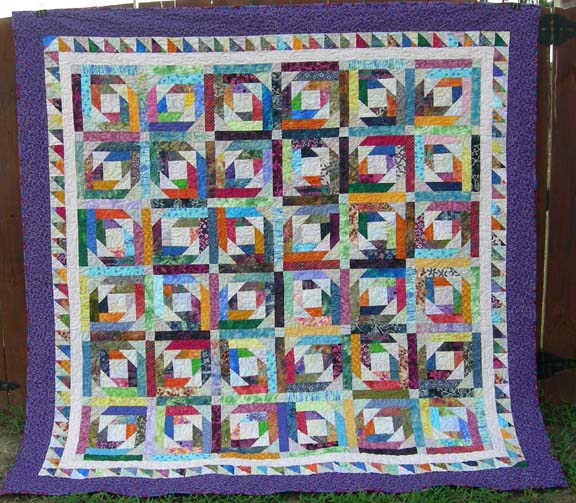
This full sized coverlet measures 78.5"X78.5" and uses 36 pineapple blossom blocks set with sashing!

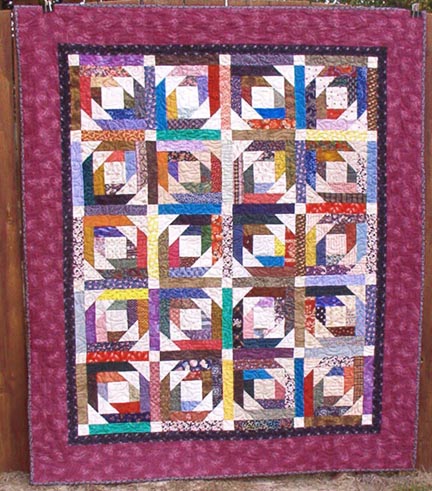
Lap Quilt size approx 57.5"X 68"and uses 20 blocks set with sashing!

I did have 20 of these pineapple blossom blocks done, it wasn't quite enough for a lap quilt, but the thought occured to me if I added sashings, and cornerstones...that it would be big enough for the center. By the time I added borders it was just right!
This quilt is related more towards the "geese in the corner" style of log cabin, than it is a true pineapple block, because the triangle corners are only sewn to two opposite diagonal sides. It still has that pineapple punch though, and it works up into a pretty quilt!
The block logs are cut from 2" scrap strips I already had waiting for me in the 2" scrap strip bin, and the pineapple corners are cut from 3.5" light strips.

For each 9" block you will need:


From 3.5" light strips cut:
From dark/medium 2" scrap strips cut:
Two 2"X3.5" rectangles
Four 2" X 6.5" rectangles
Two 2" X 9.5" rectangles.
***NOTE*** I have had several requests asking for the dimensions for this block to be made with 2.5" strips,so here you go. The construction is the same...just the piece size is different. It will make a 12" block. Larger block pieces are shown below in red.
Five 4.5" light squares (Block center and pineapple corners)
From dark/medium 2.5" strips cut:
Two 2.5"X 4.5" rectangles
Four 2.5"X 8.5" rectangles
Two 2.5" X 12.5" rectangles.
On the back of four of the 3.5" squares, draw a diagonal line from corner to corner using your ruler and your pencil. This is a stitching guide line. On smaller corners like this, I can get away with eyeballing to sew, but when you get up to stitching the diagonal on a square this big...it's best to mark that line! :c)


*NOTE* I like to chain sew! So I generally cut the pieces for 4 blocks at a time and chain feed them through the machine so I can step up production! These directions just show the construction of one block to get you started.




I move my needle over one position towards the right to give me a bit wider seam allowance. You can also draw a line if you want, but I just use the edge of my presser foot against the previous seam as a guide. Now...this next seam is just a bit under 1/2", probably close to 3/8". The reason I don't go wider is because I am aiming to get the bonus triangle squares to finish close to 3".





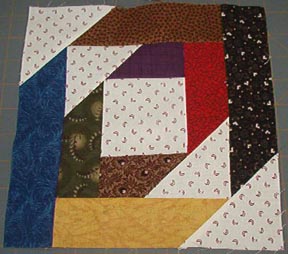
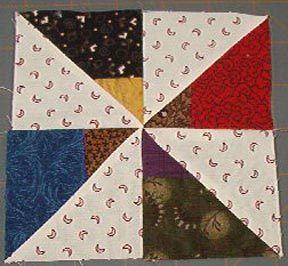
Another idea: I turned these little 1/2 square triangle squares into the pieced border on the large quilt above at the top of the page!



Chain Stitching Blocks With Sashings!
First, lay out the blocks, corner stones, and sashings just how you want them on the floor as in the second pic above. We are going to start chain assembling from the far left side, and work our way across to the right. All the across rows will be sewn together, and the rows will be held to each other by the chaining threads between the rows. I call this "Webbing The Top!" As you look at things laid out, I want you to start from the far left, working from top to bottom.....and call the row with sashings and corner stones along the left edge row 1. The next row is sashings and blocks. it is row 2. Row 3 is made from cornerstones and sashings again.....There are 9 rows in this quilt even if your eyes see it as only 4 rows with sashings in between.





Look at the pic above. You are going to flip out the second row from the first row, and then stitch the third row in place all the way down. You can see that the corner stone at the top of row three is sewn on already, and the sashing strip that goes against the block is next. Next will be another cornertone, etc....just keep sewing continuously all the way down the row! Do the entire top this way and you will have this!
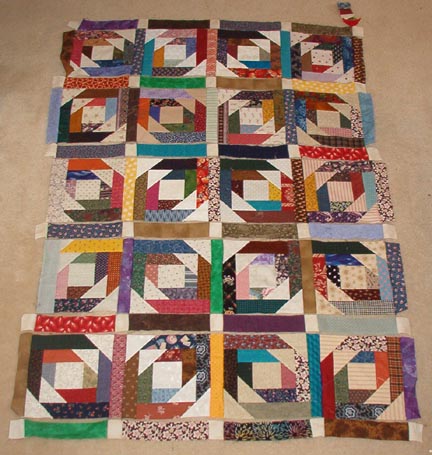
Blocks without sashings works the same way.
Now you have some decisions to make. Is it too unweildy for you to want to just leave it stitched like this and sew the rows together? You can cut the rows apart now if you want. This is a good time to do that if you want to press the seams towards or away from the sashings. This is where you decide what works for you depending on your pressing preferences.
Do I cut the rows apart? Nope! I leave them as is, and just fold one row over the other so the right sides are together and I just work with the whole thing as one unit. On this quilt I finger-pressed my seams so that they would butt up together at the cornerstones, and then I pressed with the iron after each row was added. I've done this on king sized quilts and it works fine for me to have the rows webbed together. The choice is up to you. At least if you stitch the top to the point where the ROWS are rows..there will be less chance of anything getting backwards, upside down, out of order or just plain wrong! :c)


Here is a close up of the quilting detail. I quilted this with an edge to edge design called "Whirly Gig" by Willow Leaf Studios in a varigated purple thread. I bound it in black!

If you make this quilt, I'd be happy to display your pics here!


ИСТОЧНИК: http://quiltville.com/pineappleblossom.shtml
Примеры применения блока Ананас по-американски:
1.
Серия сообщений "Блоки. МК":
Часть 1 - Игольница - витраж.
Часть 2 - Интересные блоки.
...
Часть 54 - Блок из квадратов.
Часть 55 - "10-минутный блок" по-русски или Квадрат над пропастью.
Часть 56 - Блок Ананас (американский вариант).
Часть 57 - Блок "Коробочка цветных карандашей"
Часть 58 - Блок "Квадратные звезды"
...
Часть 67 - Энциклопедия лоскутного шитья
Часть 68 - Классическая Дрезденская тарелка.
Часть 69 - И снова Калейдоскоп!
| Рубрики: | шитье/пэчворк |
| Комментировать | « Пред. запись — К дневнику — След. запись » | Страницы: [1] [Новые] |


